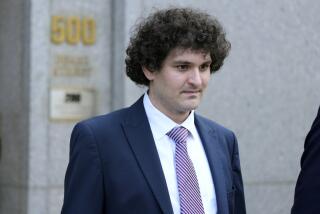Homestore Ex-CEO Sentenced to 15 Years
- Share via
The founder and former chief executive of Homestore Inc. was sentenced Thursday to 15 years in federal prison -- one of the stiffest penalties in the recent wave of corporate crime -- for his role in a $67-million accounting fraud.
Stuart Wolff, 43, also was ordered to pay a $5-million fine for failing to stop the cooking of the books at the online home-listing company, whose rise and fall tracked the late-1990s dot-com boom and subsequent crash early in this decade.
Wolff’s attorneys expressed surprise, as did legal scholars, at the penalties handed down by U.S. District Judge Percy Anderson in Los Angeles.
Wolff will appeal the sentence because it is “far longer than necessary,” defense attorney Lawrence Barcella said.
“It’s an extremely long sentence,” said Robert Weisberg, director of Stanford University’s Criminal Justice Center. The only longer term among recent cases was the 25 years given to former WorldCom Inc. CEO Bernard J. Ebbers.
Wolff spoke briefly in court and apologized for the fact that “these matters” took place on his watch, adding that he meant no harm to the company or its shareholders. But his statement did not sway the judge.
“There comes a time when you have to accept responsibility,” Anderson said. “Your failure to do that compels me to impose a substantial sentence.”
Anderson said he hoped the sentence would serve as a deterrent to other executives.
Wolff was convicted in June of 18 counts of conspiracy, insider trading, making false filings and lying to auditors. He was the 11th former Homestore executive to be convicted or plead guilty in connection with a scheme to boost the stock price.
Homestore.com of Westlake Village was one of many popular Internet companies whose market value skyrocketed at the height of the dot-com boom.
Its shares reached a record close of $122.25 in January 2000 before starting a long plunge. Two top executives resigned in 2001, the company restated its results for 2000 and 2001, and Wolff quit in January 2002 amid an internal probe. The stock was trading for less than $1 by the end of that year.
Prosecutors said the company inflated revenue through sham transactions with vendors. Homestore, the government contended, overpaid the vendors for products or services with the understanding that much of the cash would be returned to the company in the form of ad purchases by America Online Inc. and other intermediaries.
Wolff’s attorneys maintain that the falling share price was a result of market forces and cannot be blamed on him.
“It’s a sad day for business leaders. It says if you’re at the head of a company and the stock price declines, you can be subject to criminal charges,” said A. Jeff Ifrah, one of Wolff’s five attorneys present in the courtroom.
Other attorneys who have studied corporate crime agreed that the sentence was harsh.
“We’ve totally lost track of what a reasonable sentence is for white-collar crimes,” said Barry Boss, a Washington, D.C.-based defense attorney who formerly co-chaired the U.S. Sentencing Commission’s Practitioners Advisory Group. He said that judges who seek to set examples by imposing long sentences weren’t acting fairly.
Lawyers for Wolff, who had faced a theoretical maximum of 175 years in prison, had argued in court that his record as an upstanding citizen and his devotion to his family should compel a lighter sentence.
But the judge, explaining his decision, said Wolff’s socioeconomic advantages justified the 15-year term.
“You had marketable skills, you had money -- there was no excuse for this,” the judge told Wolff.
Anderson set a Nov. 13 hearing to decide whether Wolff will have to pay investors $8.64 million in restitution. The judge also will decide that day whether Wolff should remain free on bond while appealing the sentence.
More to Read
Inside the business of entertainment
The Wide Shot brings you news, analysis and insights on everything from streaming wars to production — and what it all means for the future.
You may occasionally receive promotional content from the Los Angeles Times.











